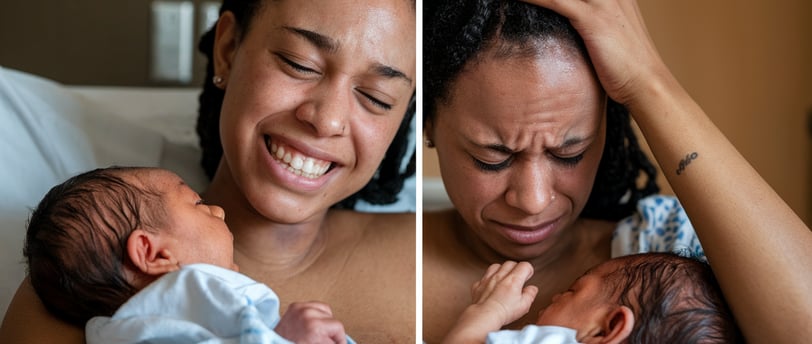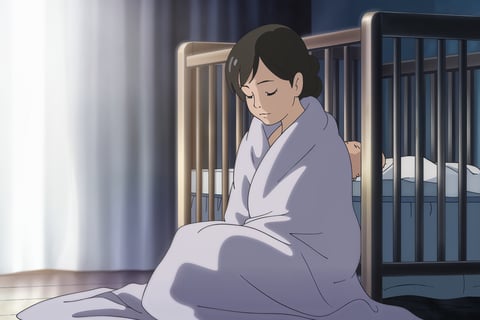Baby Blues vs. Postpartum Depression: Understanding Your Emotions After Birth
POSTPARTUM & NEW MOM LIFE


Introduction to Postpartum Mental Health
I remember the moment I brought my baby home. There I was, staring at this tiny, perfect human, filled with awe, gratitude—and an overwhelming sense of panic. The flood of emotions hit me like a tidal wave. One minute, I was crying because my baby yawned in the most adorable way, and the next, I was sobbing because I spilled my tea. No one warned me just how big the emotions would be. Welcome to postpartum mental health—the part of new motherhood that doesn’t get talked about enough.
The transition into motherhood is one of the most profound shifts a person can experience. It’s beautiful, exhausting, joyful, and terrifying, all at the same time. While the world showers new moms with congratulations and cute onesies, what often gets overlooked is the emotional toll that comes with this major life change.
For many women, the postpartum period brings about a condition commonly known as the baby blues. It’s like a hormonal rollercoaster you never bought a ticket for—mood swings, sudden bouts of crying, irritability, and overwhelming emotions. Baby blues usually show up in the first few days after birth and can last up to two weeks. They’re a natural response to the dramatic drop in hormones, the sheer exhaustion, and the realization that life as you knew it has changed forever.
But for some mothers, those feelings don’t fade. Instead, they deepen, darken, and linger. This is where postpartum depression (PPD) comes in—a condition that affects approximately 15% of new moms. Unlike baby blues, postpartum depression doesn’t just pass with time. It can feel like you’re sinking, struggling to find joy in your baby, in yourself, in anything. And it’s not something you can just snap out of.
Recognizing Baby Blues: Symptoms and Duration
If you find yourself crying over commercials, feeling extra irritable, or completely overwhelmed by this new chapter, you’re not alone. Baby blues are incredibly common, with nearly 80% of new mothers experiencing them. You may feel euphoric one moment and deeply anxious the next. One night, I found myself crying because my newborn’s socks were too cute—it made no sense, but at the time, it felt monumental. These mood swings can be frustrating, but they are temporary. Baby blues typically peak around day five postpartum and gradually improve by the end of the second week.
What helps? Rest (as much as you can get, anyway), hydration, nutritious meals, and emotional support. Lean on your partner, a friend, or that mom group on Facebook where no question is too weird. And most importantly, remind yourself that this phase is temporary. You are not failing—your hormones are just throwing a tantrum.
But if two weeks pass and you’re still struggling, or if those feelings are getting worse instead of better, it may be time to check in with yourself a little more seriously.
Understanding Postpartum Depression (PPD)
Postpartum depression isn’t just an extension of the baby blues. It’s heavier, lonelier, and harder to shake. Unlike the baby blues, which come and go like passing clouds, postpartum depression settles in like a storm. The symptoms vary but may include persistent sadness, loss of interest in things you used to enjoy, extreme fatigue, feelings of hopelessness, and even difficulty bonding with your baby.
For me, it felt like I was watching my own life from the outside, like I was going through the motions but not really there. I loved my baby fiercely, but I also felt like I was failing at everything. The exhaustion was beyond anything I had ever known, but even when my baby slept, I couldn’t rest. I knew something wasn’t right, but I was too afraid to admit it.
And that’s the hardest part. So many women suffer in silence, convincing themselves that they should just be grateful or that they’re just bad mothers for feeling this way. But postpartum depression isn’t a choice, and it certainly isn’t a reflection of your ability to be a good mom. It’s a medical condition—one that needs and deserves treatment.
Risk Factors for Developing PPD
No one knows exactly why some women develop postpartum depression while others don’t, but there are certain risk factors that can increase your likelihood. A history of depression or anxiety, a traumatic birth experience, lack of social support, financial stress, and sleep deprivation (which, let’s be honest, applies to all new parents) can all play a role. Hormonal shifts also contribute—because nothing says fun like your body playing an emotional game of ping-pong.
While risk factors don’t guarantee that you’ll experience PPD, knowing them can help you be proactive. If you suspect you’re at risk, start building a support system early. Talk to your partner about what to watch for. Line up a friend who can check in on you. Give yourself permission to ask for help before you even think you need it.
Coping Strategies and Support Options
If you’re struggling with postpartum emotions, first and foremost: You are not alone. And while the path out may feel unclear, there are real, tangible things that can help.
Small self-care habits can make a world of difference. Maybe it’s stepping outside for fresh air, taking a warm shower, or sneaking in five minutes of deep breathing when the baby naps. Movement, no matter how gentle, can also work wonders—stretching, a short walk, or postpartum yoga can lift your mood when you feel stuck.
Talking helps too. Whether it’s a trusted friend, a partner, a therapist, or a support group, saying the words out loud can take away some of their power. Therapy can be an invaluable tool, and there are even specialized therapists who focus on postpartum mental health. If professional support feels out of reach, online communities and local mom groups can offer a safe space to vent and connect.
When to Seek Help: Signs and Resources
If you ever feel like your sadness is turning into something heavier—something that lingers, something that keeps you from functioning, something that makes you feel disconnected from your baby or yourself—please, don’t wait. You deserve help. And help exists.
Look for these signs:
Feelings of hopelessness or worthlessness
Lack of interest in things that once brought you joy
Intense anxiety or panic attacks
Persistent difficulty bonding with your baby
Thoughts of harming yourself or your baby
If any of this resonates, reach out. Talk to your doctor, a mental health professional, or a trusted loved one. There are therapists who specialize in postpartum mental health, hotlines available 24/7, and support groups filled with women who understand exactly what you’re going through.
Breaking the Stigma: You Are Not Alone
Postpartum mental health struggles do not define your worth as a mother. They do not mean you love your baby any less. And they do not make you weak. In fact, admitting you need help is one of the strongest things you can do.
If you’re reading this and nodding along, feeling seen for the first time—please know, I see you. I have been you. And I promise, there is light on the other side of this. Reach out, speak up, and never, ever believe the lie that you are in this alone. You are loved, you are needed, and you are doing an amazing job, even on the hardest days. ❤️




